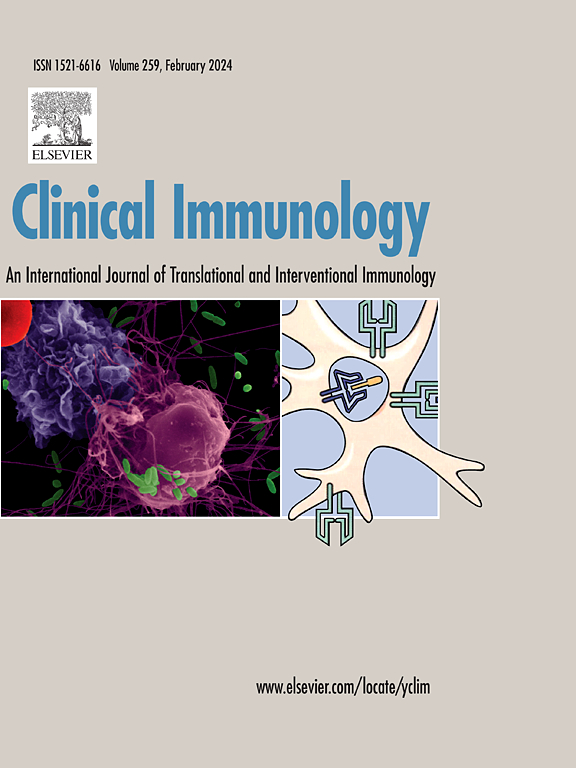HLA 进化分化对肝硬化肝移植候选者细菌感染风险的影响。
IF 4.5
3区 医学
Q2 IMMUNOLOGY
引用次数: 0
摘要
细菌感染在肝硬化患者中很常见,会增加失代偿和死亡的风险。HLA进化分化(HED)对感染风险的影响以前从未在人类中进行过研究。我们对2019年1月至2022年2月等待肝移植(LT)的肝硬化患者进行了一项回顾性研究,考察了I级和II级HED对细菌感染和肝硬化失代偿的影响。我们纳入了 269 名肝硬化患者。其中 98 人经历了 153 次细菌感染。变量选择后的多变量分析显示,II级HED越高,细菌感染越少(p = 0.034),而I级HED没有影响(p = 0.074)。细菌感染的独立风险因素包括侵入性手术(p本文章由计算机程序翻译,如有差异,请以英文原文为准。
HLA evolutionary divergence effect on bacterial infection risk in cirrhotic liver transplant candidates
Bacterial infections are common in cirrhosis patients, increasing the risk of decompensation and death. The impact of HLA evolutionary divergence (HED) on infection risk hasn't been studied in humans before. We conducted a retrospective study on cirrhosis patients awaiting liver transplantation (LT) from January 2019 to February 2022, examining class I and II-HED effects on bacterial infections and cirrhosis decompensation.
We included 269 cirrhosis patients. Among them, 98 experienced 153 bacterial infections. Multivariable analysis after variable selection revealed that higher class II-HED was linked to fewer bacterial infections (p = 0.034), while class I-HED showed no effect (p = 0.074). Independent risk factors for bacterial infections included invasive procedures (p < 0.001), ICU hospitalization (p < 0.001), recent antibiotic treatment (p = 0.046), rifaximin use (p = 0.043), and cirrhosis decompensation (p = 0.002). Neither class I nor II-HED affected decompensation risk.
This pioneering study shows that high class II-HED levels may protect against bacterial infections in cirrhosis patients awaiting LT, suggesting an immunological mechanism at play.
求助全文
通过发布文献求助,成功后即可免费获取论文全文。
去求助
来源期刊

Clinical immunology
医学-免疫学
CiteScore
12.30
自引率
1.20%
发文量
212
审稿时长
34 days
期刊介绍:
Clinical Immunology publishes original research delving into the molecular and cellular foundations of immunological diseases. Additionally, the journal includes reviews covering timely subjects in basic immunology, along with case reports and letters to the editor.
 求助内容:
求助内容: 应助结果提醒方式:
应助结果提醒方式:


